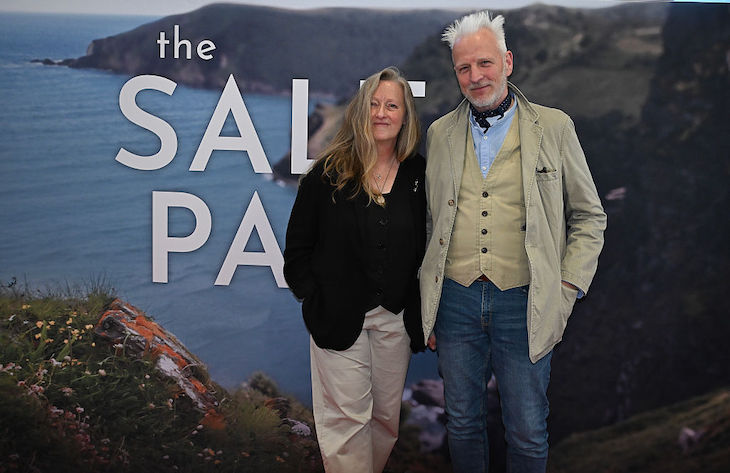One of the country’s most cherished footballers, and one of its most irritating right-on social media commentators, Gary Lineker, has been at it again. In a post on X on Friday night the former Barcelona striker declared his support for their arch-rivals Real Madrid in the Champions League final. Why? Because, citing an account that monitors politics in football, Madrid’s opposition, Borussia Dortmund, recently signed a three-year sponsorship agreement with the weapons manufacturer Rheinmetall, a firm that sells arms to Israel.
Never slow to jump on a bandwagon, Lineker may have been watching the events unfolding this week at the Hay Festival and Edinburgh International Book Festival, both of which bowed to pressure to sever their sponsorship deals with the asset manager Baillie Gifford on account of its financial connections with Israel – and for its links with un-eco-friendly concerns. It was only a matter of time before Lineker would utilise a field in which he is an authority, football, as a means to join this conga line of disapproval.
Why let facts get in the way of seductive, hollow narratives
The events unfolding at these literary festivals have been widely reported and commented on in disapproving tones across the political spectrum, from the Observer and Financial Times this weekend to the Times and Daily Telegraph during the week. And, unsurprisingly, from authors too, including Anthony Horowitz and Howard Jacobson. The latter told the Hay Festival itself: ‘The idea that anybody can come along and say “you can’t read this and you can’t read that” is a desecration. It’s a desecration of books, it’s a desecration of the idea of literature.’
Many have also pointed to the irrationality of targeting Baillie Gifford, which invests far less in fossil fuel-related companies compared to its rivals: 2 per cent of its £225 billion assets under management, well below the 11 per cent sector average. Baillie Gifford has been attacked by the boycotters for its extended connection to Israel through Amazon, a company that does business globally – not least selling books by the very authors appearing at the Hay Festival. The asset managers have been also targeted for doing business with Google, likewise a company with a universal, global customer reach.
Specifically in regards to its links with Amazon and Nvidia, Baillie Gifford has retorted that ‘practically every consumer in the developed world is using these companies’. And as the businessman Ed Warner wrote in the Times during the week: ‘There isn’t a major bank, insurer, wealth manager or investment manager who doesn’t have exposure to fossil fuels or to companies doing business in or with Israel’.
Barclays, which reportedly recently withdrew from Brighton’s annual Great Escape Festival after protesters pointed to its links with companies that supply arms to Israel, has replied in a similar vein: ‘Our clients in this sector include US, UK and European companies which supply defence products to Nato and its allies. These companies are an important contributor to our security in a time of increasing uncertainty.’
It is the same scenario when it comes to Rheinmetall, Lineker’s new bête noir. Rheinmetall do indeed sell arms to Israel, but also to the good guys of Ukraine, with the German company claiming to be ‘Ukraine’s most important defence industry partner in the fight against Russian aggression’. In December last year, Rheinmetall announced it was to produce its first armoured vehicles in Ukraine, while in March this year it announced it was to set up at least four factories in the beleaguered country.
Yet, why let facts get in the way of seductive, hollow narratives, the most voguish of which is that Israel is the source of most evil. Of course, celebrities, actors and comedians are often drawn towards such simplistic viewpoints and stances. This is why they can, as Lineker did last year, compare government policy on small boats crossing the English Channel to that pursued by Nazi Germany. This is why they are so easily hoodwinked into bogus causes, like Chris Morris’s phoney war on the made-up drug ‘cake’ or his preposterous anti-paedophile initiative ‘Non-sense’ in the 1990s television satire, Brass Eye.
As their professions suggest, actors, stand-up comedians and TV presenters literally want to be centre stage, to be the centre of attention. Hence celebrity campaigners are all too often rampant egotists, keen to assuage their own consciences. Lineker confessed as much this week. Addressing the Hay Festival, he explained the motive for his social media pronouncements: ‘I don’t think I probably make a blind bit of difference, but it matters to me,’ he said. ‘I don’t think I do it to try and influence. I do it so I can look at myself in the mirror’.
This is a candid insight into the mindset of self-regarding social justice campaigners. It seems that they are concerned foremost with themselves and with their public image, and less interested in the facts and really making a difference.







Comments